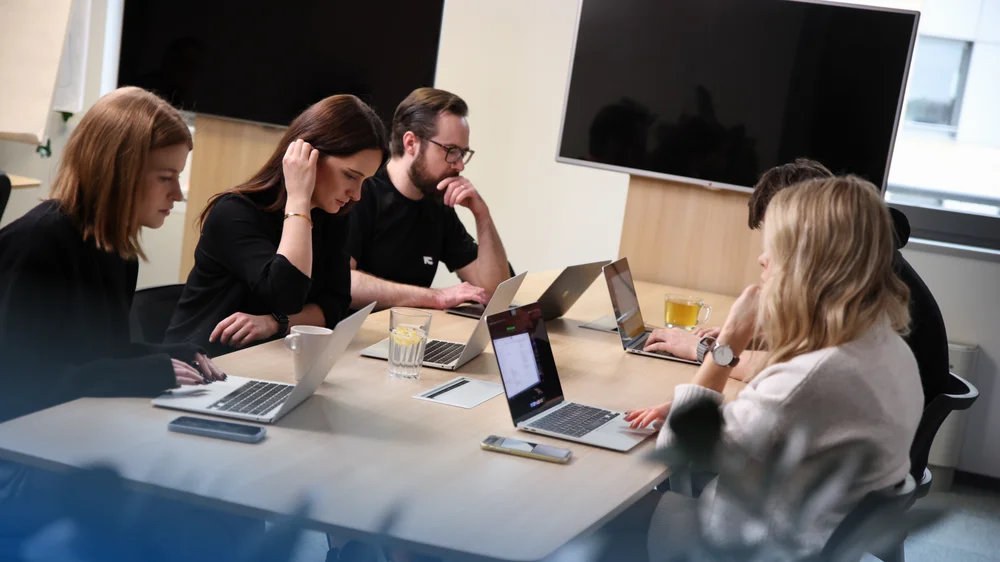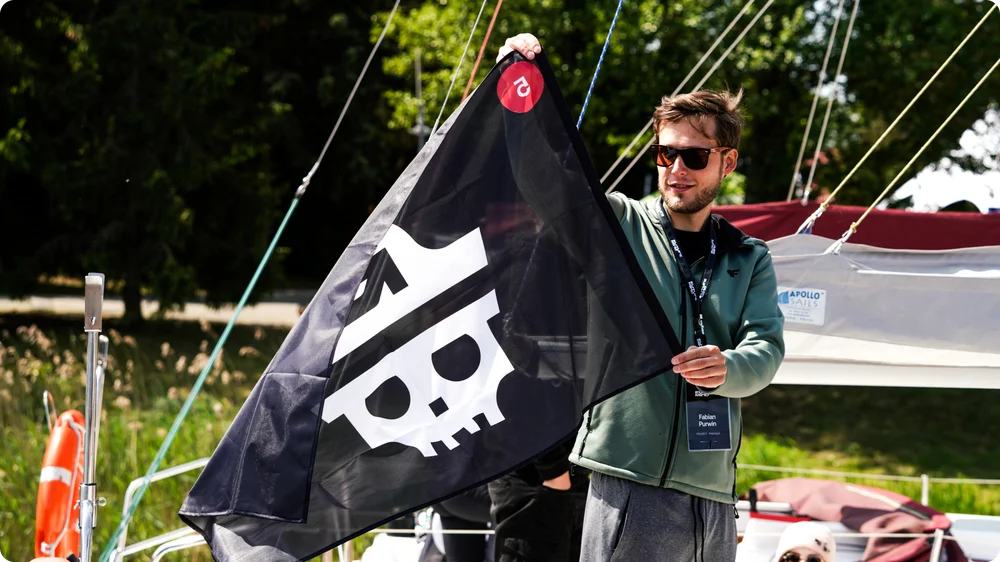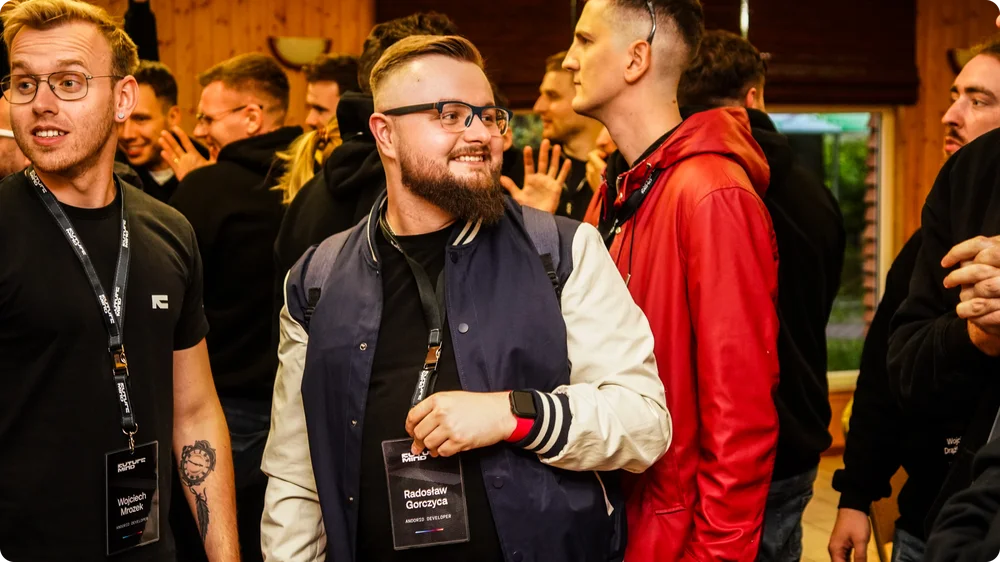
Welcome to the second installment of our Get to Know Future Mind series, your chance to learn what it's truly like to work with us, straight from our seasoned team members. If you’ve missed our first article, it’s not too late. You can catch up and read my conversation with our Product Design Team Leads here. And, this time around, I’ll be talking to our Android Team Leaders, Jakub Wiśniewski and Artur Klamborowski, both representing the Mobile department headed by Michał Klimczak.
JW (Jakub Wiśniewski): It really has been a while, over a decade! And, to be honest, I wasn't even looking for a job back then. Our Polish readers might remember Era, a leading telecom provider in the 2000s. I worked there for a good while, but after the company got bought out by T-Mobile, I got caught up in layoffs – believe it or not, these were not invented in 2022.
I thought it was a great opportunity to take a break and started looking at plane tickets. I had some ambitious travel plans… But then I got a phone call from Michał Klimczak, who’d heard I was meddling with mobile development from a mutual friend. I wasn’t so sure about starting a new job so soon, but he convinced me and I agreed to an interview. I talked to our CEO, Tomek Woźniak – back then, as the headcount was only around ten people, it was nothing out of the ordinary. We enjoyed each other’s approach to software development, so I agreed to join the company… And here I am, more than a decade later!
AK (Artur Klamborowski): I’ve been here for five years, which I believe is quite a long time in the IT industry, but Jakub makes me sound like a novice! Anyway, I actually only joined Future Mind on my second attempt. The first time I had an interview with Michał [Klimczak], it went well, but the company ended up hiring someone else and didn’t need more developers. I joined another company but didn’t find the work fulfilling and decided to start looking for something else. And, guess what, I found a Future Mind job ad. I got in touch again, and it turned out Michał remembered me and was happy to invite me on board. I started working on the żappka app, and the rest is history!

JW: A lot has changed since my first day. Back then, my onboarding was an all-hands-on-deck affair, with everyone pitching in to explain how things worked on their side of the company. It felt like a startup.
AK: It was fairly similar in my case. The first HR employee came after me! Before that, all we had was a receptionist who handled these issues. A lot has changed since then, we’ve become a much more professionalized organization with many more specialized teams, but it hasn’t changed much about how I feel here.
JW: We’re much larger now…
AK: But we’re still just as cool! By now it’s become impossible to know everyone’s face and name, though. The fastest phase of our growth happened during the pandemic, so it was mostly visible in the ever-increasing number of participants on our company-wide Zoom calls.
JW: In the past, the Tychy and Warsaw offices combined had about 15 or 16 people, including board members. Now, if we count the entire Solita group, we’re in the thousands.
But from a mobile developer’s perspective, our everyday work hasn’t changed much. Our main objective is still the project we work on, but now we have more specialized colleagues in different departments helping us succeed in this endeavor.

AK: The story is simple – I just did my job well enough that I ended up being asked to take responsibility for some of my less experienced colleagues and I agreed.
JW: It was similar in my case. We got picked for a mixture of technical competencies and soft skills.
Our role as leaders is about driving other programmers’ professional development. We establish a roadmap for each team member, identifying areas for improvement and the necessary steps to enhance their skills and contributions. Then, we hold regular 1:1 reviews, typically at least four times a year, to assess progress and make any necessary adjustments.
We’re not directly involved in every single project, so we partially rely on input from team members and project partners to gain a better understanding of the dynamics and performance of each of our colleagues. We gather feedback about their strong and weak points as well as recent achievements and shortcomings. Here is where senior developers get their chance to shine, as we rely on their opinions the most.
JW: When it comes to micro scale growth of our colleagues, we draw up a roadmap for each and every one of them. We try to focus not only on the technical side of work as software engineers but also on leadership, business acumen, and overall being a good team member.
On a macro scale, we make it a point to test out new technologies and methodologies internally before implementing them with clients. This not only ensures that we deliver top-notch solutions but also provides valuable learning opportunities for our team. We also have a dedicated Slack channel where we dive deep into all things programming. It's a hub for discussions on various technical decisions, like when it's time to transition to a new tool like we did with Jetpack Compose a few years back.
AK: We also have a weekly time slot where team members have the chance to present challenges from our projects, fostering collaborative problem-solving and knowledge sharing. Sometimes, someone will prepare a presentation on a particularly interesting topic or a novelty in the tech world, providing a learning experience to the entire team. We record these sessions and maintain a knowledge base for easy reference, ensuring that everyone has access to these insights even long after the live discussions took place. This can be especially useful for new junior or mid-level developers.
JW: And let’s not forget all the coding books we make available to our developers!

JW: From an organizational perspective, the Mobile department has three main parts: Android, iOS, and Flutter. Android and iOS specifically involve more people, so they’re divided into two teams each, led by two leaders who oversee the developers within their respective areas – for Android, that’s us two.
But we also get teamed up based on project needs. That’s where Project Leaders come in: each project is led by either one of us or one of our Senior Developers. Project Leaders are responsible for explaining the intricacies of software development and architecture to clients or Project Managers in order to facilitate decision-making for business stakeholders. But that's not all – they also support our design and analytical teams, manage people, and stay on top of timelines to ensure everything runs smoothly.
AK: The specifics of each team’s setup are dependent on each project's unique dynamics and requirements. We always strive to adhere to best practices, but we also recognize the importance of flexibility. What works for one team may not necessarily work for another, so we're constantly evaluating and refining our approach to ensure it's the right fit for our team and their skill sets.
JW: Of course, it’s as much about the client as it is about our team members. We need to adapt our framework to both deadlines and the client’s level of involvement.
AK: That’s true. Some decisions may come down to what’s been agreed with the client, for instance, whether we apply Agile or Waterfall development.
JW: An important aspect of our work is that we view our collaboration with clients as a true partnership rather than a form of outsourcing. Our approach is all about co-creation – we work hand in hand with clients to bring their ideas to life. It's not just about taking orders; it's about engaging in a dialogue where both parties contribute insights and expertise.
When clients bring us their ideas, we assess what's feasible, what's worthwhile, and how we can elevate those concepts to new heights. It's a dynamic process where ideas are refined and transformed through the lens of our expertise and proposals.
Ultimately, the products we deliver are a fusion of our skills, our clients' vision, and the collaborative effort we put in together. It's this spirit of partnership that sets us apart and drives the success of our projects.

JW: One of the defining aspects of our team culture is that we fully embrace remote work. We recognize that different team members have different preferences and needs when it comes to their work environment. Some people choose to come to the office for that sense of connection and camaraderie, especially in their first months when they’re still learning how things work at the company. Others prefer the freedom and flexibility of working remotely, and that's totally cool with us. We even have some people enjoying workations on the other side of the world.
Of course, with all this freedom comes a responsibility to ensure smooth collaboration. We all show up to regular team calls and do our best to make decisions that don't disrupt the flow of work for our colleagues.
AK: I've been a remote work advocate long before it became the trendy thing to do. I've navigated numerous projects without ever stepping foot in an office, and the results speak for themselves.
Sure, being in the same time zone definitely makes coordination smoother, but even when that's not the case, we know how to make it work. Tools like Slack and a commitment to responsiveness help us stay connected and on track, no matter where we are in the world.
JW: Our process aims to find candidates who not only possess the technical skills for the job but also align with our team's culture and values. We start with a simple programming task and, once that’s out of the way, we schedule a call to discuss the candidate’s background and experience.
We specifically pay attention to developers’ communication skills and how effectively they articulate their thoughts and ideas. Communication is key in our line of work, so it's crucial that candidates demonstrate the ability to engage in constructive conversations.
We also assess if the candidate is a cultural fit. We're looking for humble, open-minded people with a collaborative mindset who welcome constructive feedback. Being overly uptight or mean can be a dealbreaker, as we try to think forward and prevent team conflict.
AK: That’s an easy one. It’s the people… and the quality of the products we deliver.
JW: I haven’t stayed here for over 10 years for no reason. Even 5 years is a long time in IT, at this stage, I’m too much of a veteran to even classify as a dinosaur, I’m a fossil. And I fully agree with Artur, it’s about the people and the projects we get to work on.
TJ: Amazing. Thank you for the interview and keep up the good work!